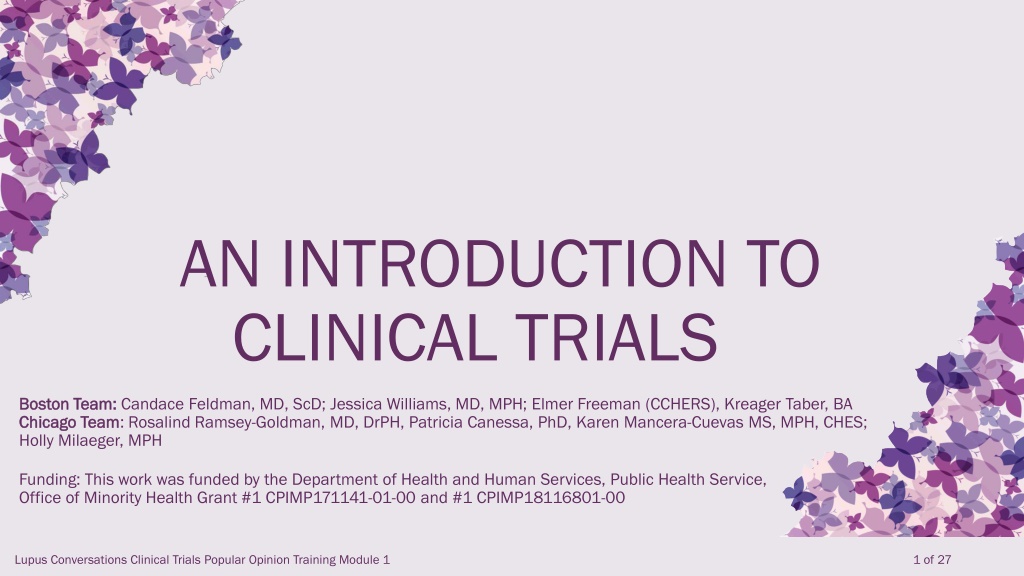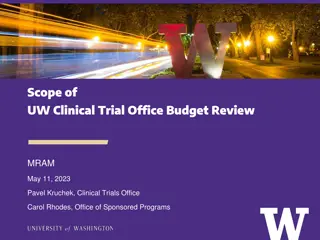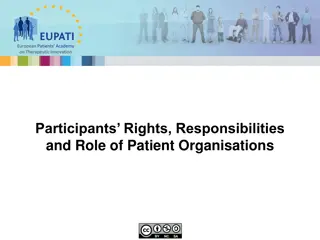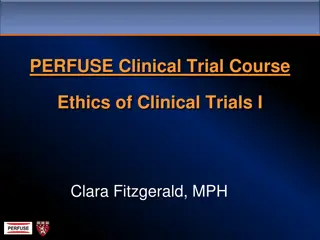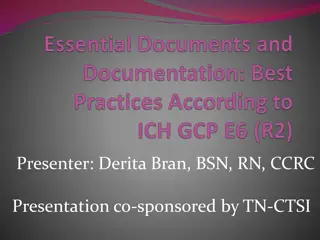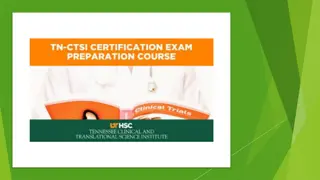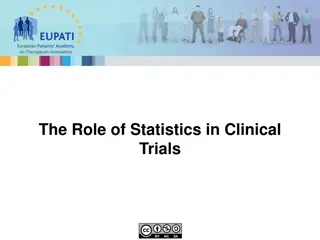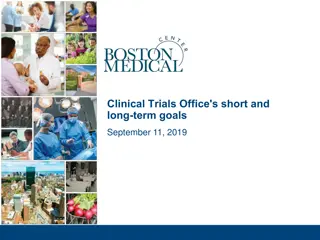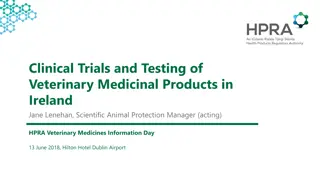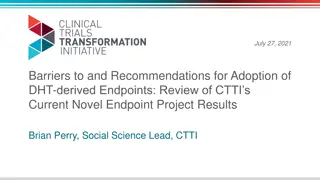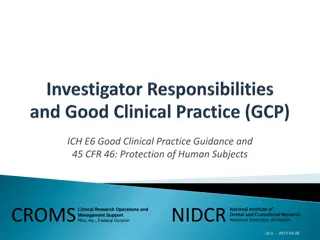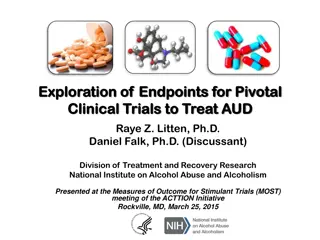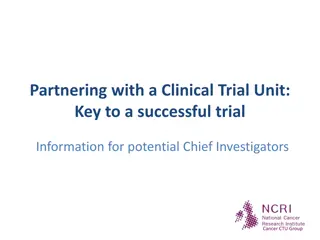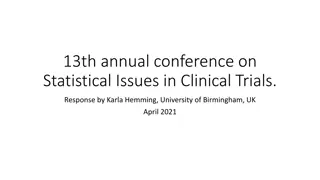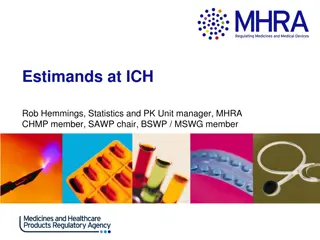Introduction to Clinical Trials and Important Terms
This content provides an overview of clinical trials, including the goals, phases, study funding, and important terms such as placebo. Clinical trials aim to study the impacts of health and disease, evaluate treatments, and ensure safety and effectiveness. The phases of clinical trials are explained, showing the progression from small to large groups. Funding sources and the use of placebos are also discussed, highlighting the vital role they play in research.
Download Presentation

Please find below an Image/Link to download the presentation.
The content on the website is provided AS IS for your information and personal use only. It may not be sold, licensed, or shared on other websites without obtaining consent from the author. Download presentation by click this link. If you encounter any issues during the download, it is possible that the publisher has removed the file from their server.
E N D
Presentation Transcript
AN INTRODUCTION TO CLINICAL TRIALS Boston Team: Boston Team: Candace Feldman, MD, ScD; Jessica Williams, MD, MPH; Elmer Freeman (CCHERS), Kreager Taber, BA Chicago Team Chicago Team: Rosalind Ramsey-Goldman, MD, DrPH, Patricia Canessa, PhD, Karen Mancera-Cuevas MS, MPH, CHES; Holly Milaeger, MPH Funding: This work was funded by the Department of Health and Human Services, Public Health Service, Office of Minority Health Grant #1 CPIMP171141-01-00 and #1 CPIMP18116801-00 Lupus Conversations Clinical Trials Popular Opinion Training Module 1 1 of 27
Refresher: What is the goal of clinical trials? A. Study the impacts, patterns, causes, and effects of health and disease B. Examine how patients access health care services C. Evaluate effects of a specific treatment or medication on the people s health D. All of the above 2 of 27
Phases of Clinical Trials One One Two Two Four Four Three Three Treatment approved and made available. Small group of people (20- 80) Larger group of people (100-300) Large groups (1,000-3,000) Safety information collected, and treatment compared with others Treatment and its safety studied for the first time Effectiveness and safety of treatment determined Researchers track risks, benefits, and safety. 3 of 27
Study Funding Studies are funded by sponsors sponsors Sponsors can be people, institutions, companies, or other organizations that finance and manage the trial but often do not actually do the research 4 of 27
Important Terms in Clinical Trials: Placebo Placebo Placebo Placebo- inactive product that resembles the treatment being tested. Used because researchers won t know if a treatment works or if it is safe if there is nothing to compare it to. Not used if a lack of treatment can put you at risk! Used as a comparison to determine effectiveness and safety For example, infusion of belimumab drug versus an injection of saline (placebo) effectiveness and safety of the treatment. Helps answer two questions: Helps answer two questions: 1) Does the new treatment work? 1) Does the new treatment work? 2) Does it do what it is expected to do? 2) Does it do what it is expected to do? Often placebo arm receives the care their primary provider prescribes (not nothing) Often placebo arm receives the care their primary provider prescribes (not nothing) 5 of 27
Review: Example of Informed Consent Document Informed Consent Document Study Details Study Details What is being studied? Who is paying for it? IRB number Shows that the study plan was reviewed by the IRB Who is performing the study? How can you contact them? How many participants does the study need? How many places will they try to recruit participants? Study Purpose Study Purpose Why is this study being done? Why is this study important? Begins by explaining the basics of the study Info Who, What, Where, and Who, What, Where, and Why Why 6 of 27
Review: Example of informed consent document Informed Consent Document The Informed Consent Document will then describe how how the study will be done Protocol (roadmap) Protocol (roadmap) What is the study design? Will participants be randomized into groups? Who will be blinded ? What will happen during the study? Number of visits? What will happen at each visit? What information (medical history, examination, blood sample, questionnaires, treatment) will be collected or given at each visit? The kind of information or treatment may be different at each visit Are placebos used? Info 7 of 27
Review: Example of informed consent document Informed Consent Document Risks of the Study Risks of the Study Common risks include: Your health may or may not improve Blood draw risk Confidentiality risk Pregnancy risk The document will then provide new information that might impact your participation Risks Risks and Benefits Benefits of enrolling in the study Info Benefits of the Study Benefits of the Study Common benefits include: Access to expert medical care Learning more about a health condition you have Some risks and benefits are unknown 8 of 27
Review: Example of informed consent document Informed Consent Document Payment for participation Payment for participation How much How much will you be paid? When When will you be paid? What do you have to do in the study to be paid? Alternative Treatment Alternative Treatments Are there other ways to treat the condition being studied? You must be told of these options if they exist Payment for study Payment for study- -related injury related injury What will happen if you get hurt or sick from something in the study? What might be charged to your insurance? Only would happen if the event is due to a pre-existing condition or if you aren t following the study procedure The document will then explain the payment payment for the study and other treatments treatments for the condition being studied Researchers want to make sure Researchers want to make sure that participants are choosing that participants are choosing the best option for them the best option for them other Info The document will also explain what will happen if you become sick or hurt during the study 9 of 27
Review: Example of informed consent document Informed Consent Document The document will then explain how you can stop participating participating in the study if you don t want to continue Volunteer Participation and Volunteer Participation and Withdrawal Withdrawal How can you tell the study staff you don t want to participate in the study anymore? Why might your doctor or the study sponsor want you to stop the study? stop Explains how your information will be kept private private Info Confidentiality Confidentiality Permission to review your medical records List of who may see the information collected during the study, including laboratory test results 10 of 27
Review: Example of informed consent document Informed Consent Document Explains what the study team will do to protect your privacy Who will see the data and when they will stop collecting new data HIPAA Authorization HIPAA Authorization Protections to respect privacy From the Health Insurance Portability and Accountability Act of 1996 Lists who look at your medical record and study data Tells you when the study team will stop collecting new data and when your consent for the study expires Info At the end, you will sign document to consent sign the Signatures Signatures Your consent Person who reviewed and consented you 11 of 27
Lets Revisit the Consent Form How do you think a description of a placebo treatment would show up in the study s IRB and consent form? IRB- would have a detailed description of the placebo being used and its safety information Consent form- Research team would tell you if a placebo was being used in the study 12 of 27
Important Terms in Clinical Trials: Blinding Single Blind Single Blind Participants are not told which treatment they receive Patients and their Patients and their physicians can ALWAYS physicians can ALWAYS find out find out which which treatment they are receiving if it is they are receiving if it is medically necessary or for medically necessary or for safety reasons! safety reasons! Blinding Blinding- Study design meant to keep research team members and participants from influencing study results treatment Double Blind Double Blind Participant and Research Team don t know which treatment each person received, and a person outside of the study keeps track 13 of 27
Important Terms in Clinical Trials: Randomization Randomization Randomization- treatments are assigned to patients randomly (like a coin toss) Done to reduce the chance that scientists expectations of what should happen with a treatment will influence the results they see from the research (bias) (bias) 14 of 27
Treatments are Evaluated During the Trial Effects and safety of treatments are compared during the trial. If one is better, trial is stopped so participants can get the new treatment. SELENA trial SELENA trial- - Tested if oral contraceptives Tested if oral contraceptives were safe for lupus patients to take. were safe for lupus patients to take. At the occurrence of a lupus flare, the physician would assess whether or not it was safe for the study subject to continue Petri, Michelle, et al. Combined Oral Contraceptives in Women with Systemic Lupus Erythematosus . N Engl J Med 2005; 353:2550-2558. DOI: 10.1056/NEJMoa051135 15 of 27
What has Caused Hesitation around Clinical Trials Participation? History of unethical treatment of certain populations Experiences of racism Concern of feeling like a guinea pig Strict exclusion criteria Fear of receiving the placebo arm Not much incentive Image result for diversity in clinical trials 16 of 27
What has Caused Hesitation around Clinical Trials Participation? Fear of side effects from a new medication Lack of trust in the health care system Lack of time Hard to understand consent process 17 of 27
Which one is not a clinical trial? A. A study looking at the risk of development of lupus associated with how close patients live to toxic waste sites B. Testing whether or not a new drug works better than hydroxychloroquine to prevent lupus flares C. Studying whether an in-person walking group is more effective at getting people to exercise than a mobile phone app D. A study trying to determine whether fatigue among lupus patients is less among patients receiving vitamin D supplements compared to placebo 18 of 27
What Should You Learn Before Enrolling? Risks Potential harms and risks, as well as the chance of harm or risk occurring Treatments may have unpleasant or life- threatening effects Study may require a larger time commitment than standard medical care 19 of 27
What Should You Learn Before Enrolling? Potential Benefits Contribute to studies developing new treatments/procedures Chance to help others in the future and to advance science Access to new treatments before they are available to the public Access to regular medical attention from a full research team 20 of 27
What Questions Should You Ask about Study Safety? What is the purpose of the study? Why do the researchers think that their approach will be effective? Who reviewed and approved the study? Is patient safety monitored throughout the trial? What happens if in the middle of the study, one group is doing much better (or worse) than the other? What are the short and long term risks and benefits? 21 of 27
What Questions Should You Ask about Coordinating Trials and Normal Healthcare? Will you be able to continue your normal medications and treatment during the trial? Image result for patient talking to doctor Who will be in charge of your care, and where will the care occur? Will your doctor know exactly what you are receiving and the results of any tests that are done? 22 of 27
What Questions Should You Ask about the Study s Costs? How will the study affect your daily life? Will you have to pay for any portion of the trial, and how much will it cost? Is your parking or transportation reimbursed? How many extra visits will you have to make? Who can help you answer questions from your insurance company or health plan about the trial? 23 of 27
What Questions Should You Ask about Confidentiality and Contacts? Who has access to your information? How will this information be protected? Will it be shared with anyone? Who can you contact with any questions, concerns, side effects? 24 of 27
Questions? Thank you! Thank you! Questions? 25 of 27
Words to Remember Randomization Randomization- treatments are assigned to patients randomly (like a coin toss) Bias Bias- - scientists expectations of what should happen with a treatment influence the results they see 26 of 27
Funding and Acknowledgements Funding: This work was funded by the Department of Health and Human Services, Public Health Service, Office of Minority Health Grant #1 CPIMP171141-01-00 and #1 CPIMP18116801-00 Boston Team: Boston Team: Candace Feldman, MD, ScD; Jessica Williams, MD, MPH; Elmer Freeman (CCHERS), Kreager Taber, BA Chicago Team Chicago Team: Rosalind Ramsey-Goldman, MD, DrPH, Patricia Canessa, PhD, Karen Mancera-Cuevas MS, MPH, CHES; Holly Milaeger, MPH 27
